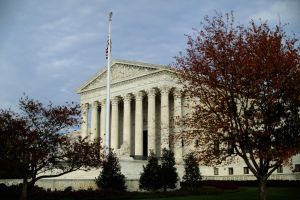New Atheist Holiday Ads Accuse Christians of Intolerance
The clash between Christians and atheists for the soul of Christmas rages on.
The American Humanist Association fired the most recent salvo by unveiling its third annual holiday public awareness campaign Monday. Titled "Bias Against Atheists Is Naughty, Not Nice," the nationwide media blitz runs until Monday and highlights alleged cases of discrimination against atheists and agnostics.
"We want to challenge people who supposedly love their neighbor and apply that to us as well," said Roy Speckhardt, AHA's executive director. "These kinds of incidents are bubbling up more given a larger number of people are talking out loud about their lack of faith. Prejudice against any group limits our potential as a society."
Speckhardt said the ads show Santa Claus drafting his naughty list against those his organization asserts assault nonbelievers' civil liberties. The provocative pictures are placed on billboards and newspapers in towns where acts of intolerance against atheists and agnostics have allegedly taken place. The campaign also includes smiling nonbelievers in Santa caps on D.C. metro buses proclaiming that those who "don't believe in God" should "join the club."
"Humanists get their knowledge from science rather than ancient texts and divine revelations," Speckhardt said. "This is the first time we've called out those prejudiced against us to rethink that prejudice. I hope people take them to heart and treat everyone as equally as they can this holiday season."
Mathew D. Staver, founder and chairman of the Liberty Counsel, said that the campaign was a crass attempt at restricting the religious freedom of Christians passionate about Christmas. As the birthdate of Christianity, he said no other holiday deserved more public worship.
"Christmas is a moment of reflection upon Christ's birth and the salvation it brings for us," Staver said. "It's important to remember our origins and reason for being. We try to make sure the real reason for the season is not censored."
Staver said his organization fights censorship of the holiday's Christian traditions with its "Friend or Foe Christmas Campaign," now in its ninth year. The initiative educates society and businesses on the Christian faith, he said, ensuring they keep its part in Christmas intact through litigation if they don't recognize believers' right to religious freedom.
"People either censor Christmas out of ignorance concerning religious law or they worry they may offend someone else," Staver said. "Retailers, meanwhile, should not profit off Christmas while pretending it doesn't exist."
Speckhardt said his group's worldview allows people the chance to act good without God. Moreover, he believes the AHA's ad campaign increased awareness of the value of civil liberties while building a more tolerant future.
"We don't have any problem with the holidays," Speckhardt said. "Most atheists and agnostics celebrate Christmas like any other Americans. We don't try to cause offense with our ads, but for those offended by our very existence, there's not much we can do about it."
Staver countered that groups like AHA shouldn't analyze Christmas given they lacked compassion for its spiritual basis. This fundamental separation, he said, meant that they often disrespected the rights of Christians practicing their faith.
"I think a campaign like this shows how bankrupt the AHA is by trying to offend people by secularizing a holiday like this," Staver said. "They have a right to their own viewpoint but the timing is very inappropriate. It shows how out of step they are from the rest of society."





























